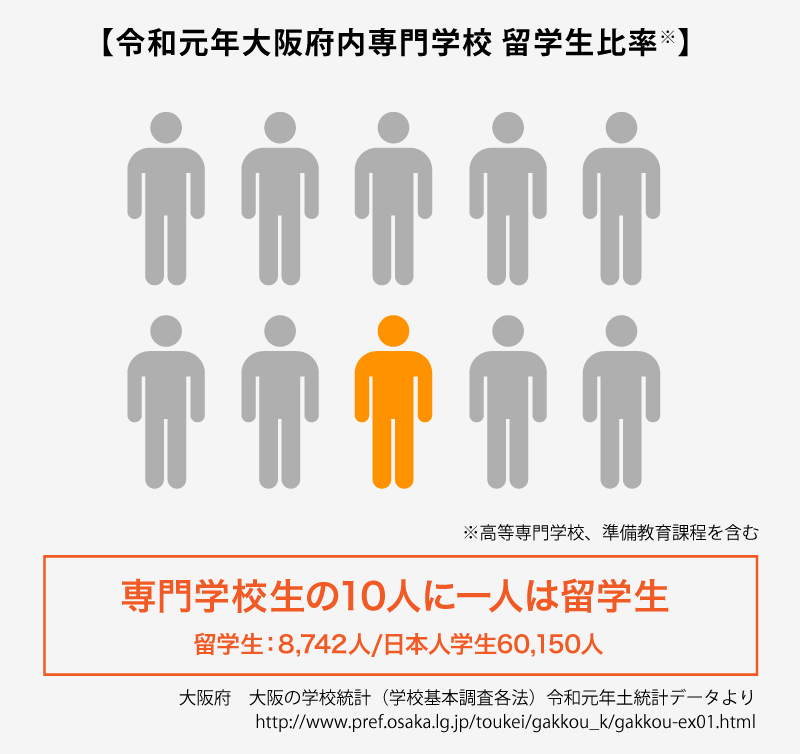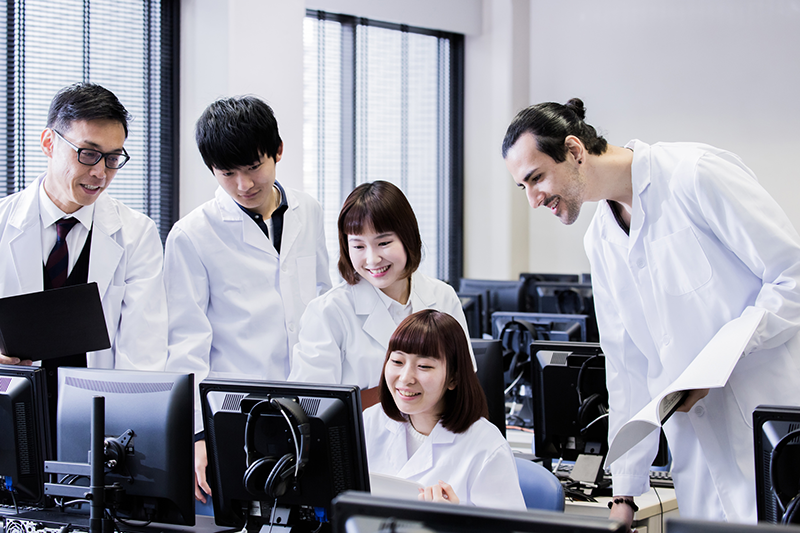Features of Japanese “Professional Training College”
Like universities, Professional Training College are higher education institutions for people who have graduated from high school or higher. We respond to the needs of people of various ages and careers, and provide practical education that emphasizes collaboration with companies and actual workplaces.

Difference between Professional Training College and unlicensed school
Professional Training College are schools that meet Japanese legal standards and are also called accredited schools. Please note that unaccredited schools do not offer scholarships, student discounts, or university transfers. All schools listed on this site are accredited schools.

Difference between Professional Training College and university
The biggest feature of Professional Training College is that you can intensively study specialized subjects. Acquire skills and experience through a curriculum tailored to the times. It is characterized by its strong collaboration with companies and its high employment rate in the industry.

Educational content of Professional Training College
The learning at Professional Training College is broadly divided into eight fields based on educational content, and each field is classified as follows. Looking at the number of international students admitted by field, three fields account for 71.3%: 30.7% in the commercial field, 23.1% in the industrial field, and 17.5% in the cultural and liberal arts field. (FY2020 Report on the actual situation regarding globalization response at Specialized Training College Specialized Training College globalization response promotion support project)
Industrial fieldTechnology
We will develop human resources who support Japanese manufacturing, such as engineers involved in IT, electronics, electricity, and robots, architects, civil engineering engineers, and auto mechanics.
Information processing, computers, automobiles, architecture / civil engineering, electricity / electronics, robots / machines, surveying, landscaping, etc.
Agricultural fieldAgriculture
Through research on biotechnology and food safety, gardening and flower business, you will acquire practical skills related to agriculture.
Agriculture, horticulture, biotechnology, livestock, environment, chemistry, etc.
Medical fieldMedical Care
We train specialists who support life, such as nursing / dental hygiene, and rehabilitation such as physical therapists and occupational therapists, whose needs are increasing as the population ages.
Nursing, physiotherapy / occupational therapy, dental hygiene, judo rehabilitation, beam / kyu, clinical examination / engineering, radiological examination, etc.
Hygiene fieldPersonal Care and Nutrition
It can be divided into two groups: the "barber / beauty" group, which includes makeup, nails, and beauty treatments in addition to hair styling, and the "nutrition / cooking / confectionery" group, which develops human resources related to food.
Barber, beauty, beauty treatment, makeup, nutrition, cooking, confectionery / bakery, etc.
Education / social welfare fieldEducation and Welfare
We train staff involved in welfare projects, such as kindergarten teachers, nursery teachers, and care workers who care for the elderly and people with disabilities.
Nursing welfare, social welfare, medical welfare, mental health welfare, early childhood education, childcare, psychology, etc.
Commercial practice fieldBusiness
We train specialists in a wide range of business fields, such as office work such as accounting and bookkeeping, and services such as travel, tourism, and hotels.
Business, bookkeeping / accounting, travel, hotels, bridal, management, secretaries, etc.
Clothing and home economicsFashion and Home Economics
From designers, pattern designers, stylists to occupations related to distribution, you will learn the basic knowledge and skills of each, and also acquire a sense of design.
Japanese dressmaking, knitting / handicraft, fashion design, fashion business, miscellaneous goods design, stylist, etc.
Culture / culture fieldCulture and General Education
Departments such as art such as design and photography, entertainment such as video and music, and law aiming to take the civil servant examination are classified.
Design, art, photography, manga, anime, voice actors, media, music, video, games, interpreters / translators, guides, sports, health, animals, etc.
Cost of attending Professional Training College
Tuition fees at Professional Training College vary depending on the field and department. It is important to check the payment method and deadline in advance, such as how much is required at the time of enrollment and whether payment in installments is allowed. Also check the amount you will need from the second year onward.
Cost of going on to a Professional Training College
| Average amount by 8 fields | Average first year tuition |
|---|---|
| Industrial field | 1,309,833 yen |
| Agricultural field | 1,287,000 yen |
| Medical field | 1,415,714 yen |
| Hygiene field | 1,511,250 yen |
| Education / social welfare field | 1,079,250 yen |
| Commercial practice field | 1,116,000 yen |
| Clothing and home economics | 1,085,000 yen |
| Culture / culture field | 1,172,000 yen |
Source: Student Guide to Japan 2019-2020/Japan Student Services Organization (JASSO)
Conditions for entering a Professional Training College
To enter a Professional Training College, you must meet one of the following conditions regarding your academic background and Japanese language ability.
1
Those who have completed 12 years of school education in a foreign country
2
Those who have passed the academic ability certification test equivalent to completing a 12-year course in a foreign country and have reached the age of 18.
3
Those who have completed a foreign school designated as equivalent to a foreign high school in Japan and have reached the age of 18.
Four
Those who hold an International Baccalaureate, Abitur, or French Baccalaureate qualification, or meet the school's individually determined results for the GCEA level exam, and have reached the age of 18.
Five
Those who have completed a 12-year course at an educational facility accredited by an international evaluation organization (WASC, CIS, ACSI) and have reached the age of 18.
6
Those who have graduated or completed a junior college, university, or graduate school in a foreign country
7
About Japanese ability
Classes at Professional Training College are held in Japanese, so you must meet one of the following requirements: *2
・Those who have received Japanese language education for 6 months or more at a Japanese language school specified by the Minister of Justice by public notice ・Passed N1 or N2 of the Japanese Language Proficiency Test (JLPT) conducted by the Japan International Educational Support Association and the Japan Foundation・Those who have obtained a score of 200 or more in the EJU (Japanese language subjects (total of reading, listening, and super reading comprehension)) administered by the Japan Student Services Organization (EJU).
*1 For items 1 to 3, if the course is less than 12 years long and you have not completed the designated course in a foreign country, you will be required to complete a designated preparatory education course or course at a training facility. There may be cases.
*2 There are setting conditions other than those listed above. For details, please check the Immigration Services Agency website.
http://www.moj.go.jp/isa/publications/materials/nyuukokukanri07_00022.html
Please download the PDF booklet containing information about entering Professional Training College below.
